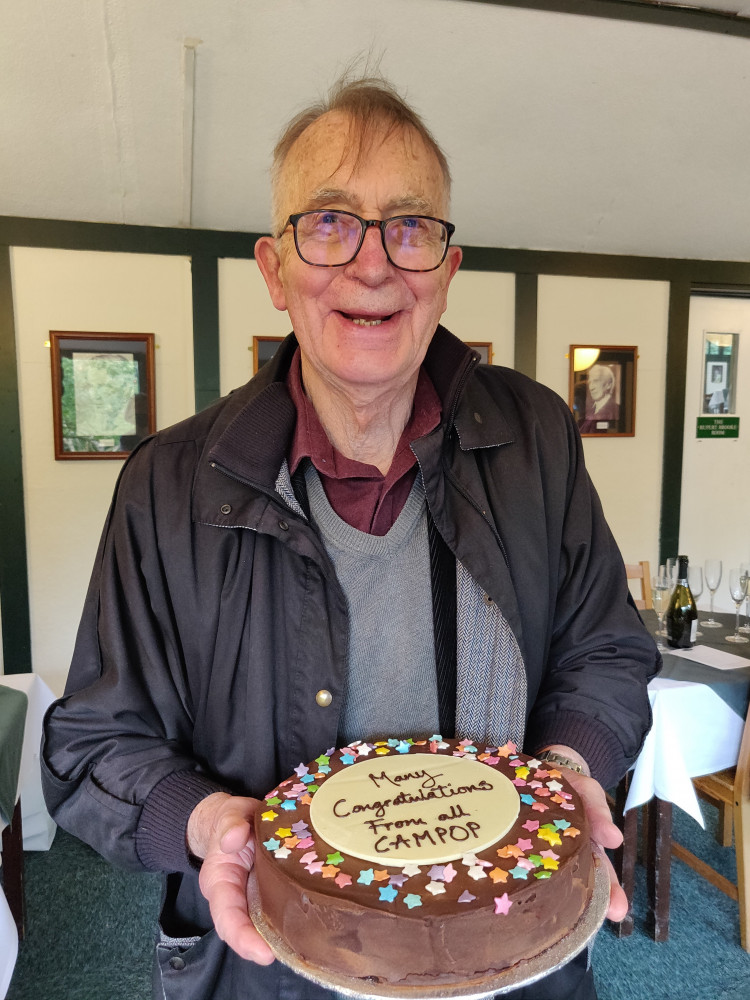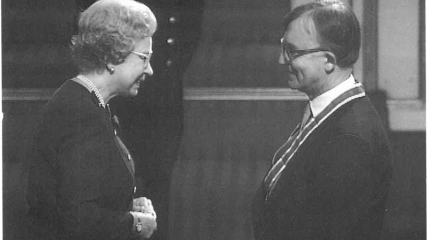Professor Sir Tony Wrigley FBA (17 Aug 1931 – 24 Feb 2022)
It is with great sadness that we report the death of Tony Wrigley, Honorary Fellow and former Master (1994–2000). Tony’s contributions to historical demography, to the University, and to the life of this College were profound and lasting.
Tony was an economic historian and historical demographer of England between the reigns of Elizabeth I and Victoria. He was a pioneer in the field of demographic reconstruction. He is best known as the co-founder in 1964, alongside Peter Laslett, of the Cambridge Group for the History of Population and Social Structure (Campop), a research centre (now based in the Faculty of History and Department of Geography) which undertakes quantitative research in family history and demographic history. The fundamental importance and originality of Tony’s work in these fields is beyond doubt. Together with Laslett, he established the history of family forms as a major international field of enquiry supporting a number of scholarly journals. He is the author or editor of at least seventeen academic books, mostly published by Cambridge University Press, and dozens more articles in learned journals. Many of these are still standard undergraduate texts for economics and history courses.
 Tony first came up to Cambridge in 1949 as an undergraduate and then postgraduate at Peterhouse. After stints as a Fellow of Peterhouse, Lecturer in the Department of Geography at Cambridge, Professor of Population Studies at the London School of Economics and a Senior Research Fellow at All Souls College, Oxford, he returned to Cambridge as Professor of Economic History in 1994. In the same year he was also elected Master. He was made a knight bachelor in the New Year’s Honours List 1996 for “services to historical demography”.
Tony first came up to Cambridge in 1949 as an undergraduate and then postgraduate at Peterhouse. After stints as a Fellow of Peterhouse, Lecturer in the Department of Geography at Cambridge, Professor of Population Studies at the London School of Economics and a Senior Research Fellow at All Souls College, Oxford, he returned to Cambridge as Professor of Economic History in 1994. In the same year he was also elected Master. He was made a knight bachelor in the New Year’s Honours List 1996 for “services to historical demography”.
Tony served in a range of academic and other posts in his field. At various times he was President of the British Society for Population Studies, President of the Economic History Society, Editor of the Economic History Review, Chairman of the Population Investigation Committee, and Chairman of the Newton Trust. He was also an Honorary Fellow at Corpus and at Peterhouse, a Fellow and former President of the British Academy, and an honorary foreign member of the American Academy of Arts and Sciences. He was still an active member of the Cambridge Group for the History of Population and Social Structure, attending its informal seminars until very recently. Late last year Tony celebrated his 90th birthday with members of Campop at Grantchester (right).
Tony’s time as Master of this College was marked by a deep concern with the then relatively under-developed (and certainly under-discussed) challenges of access and widening participation, and with a radical plan for re-housing the Parker Library. He will be remembered for his strong commitment to both these issues, on which the College can be fairly said to have made substantial and pleasing progress in the two decades since his Mastership. Simply put, Tony pointed the College in the right direction.
The Master, Christopher Kelly, summed up the sense of loss in the Fellowship: “It was an honour to have Tony as Master for six years; and a real privilege to be led by a scholar of such evident international distinction – matched by his modesty, his approachability and his integrity. It was a powerful and inspiring combination.”

